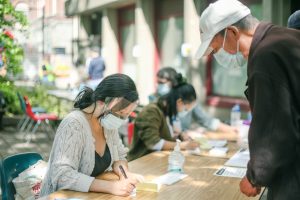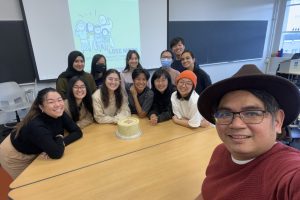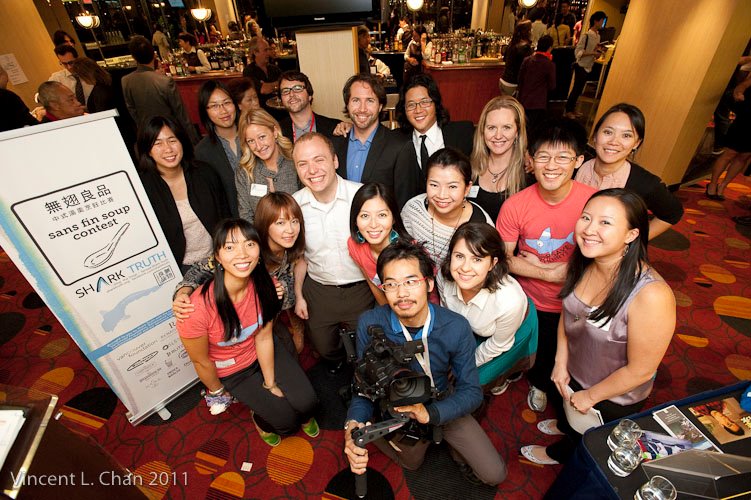
Tell us a bit about the history of your organization. How and why did it start?
Hua Foundation’s origins trace back to its initial establishment under a different organization. The co-founders, predating my involvement, initiated the organization, under a campaign known as Shark Truth. This campaign sought to bridge the gap between cultural practices and environmental activism, particularly in the context of Chinese banquet culture and weddings where shark fin is considered a delicacy and served as a symbol of success and prosperity. The co-founders aimed to discourage the consumption of shark fin at wedding banquets, and in the process, uncovered the complexities within the environmental organizing space. The journey was marked by encounters with racism and xenophobia, prompting a crucial question about how to balance culture and activism.
In navigating this space, we recognize the unique position of those born or raised at a cultural intersection, often akin to straddling multiple worlds. It’s about preserving traditions and culture while integrating the knowledge gained from our everyday experiences. In our early years, our focus centered on food security, emphasizing the importance of accessing food that is familiar to us. For example, many food banks provide shelf-stable items like mac and cheese and pasta, but for a low-income Chinese senior, these may be entirely unfamiliar. Their desire for traditional Chinese foods underscored a critical aspect of understanding food security: agency.
Over time, our work has evolved and expanded to include anti-racism and equity initiatives, reflecting a commitment to addressing broader societal challenges, and understanding the root causes that affect individual issues such as food security.
Why does precarity matter to you right now and for the future?

At a broader level, our organization is deeply engaged in equity and anti-racism work. When considering precarity, its disproportionate impact on racialized communities is a central concern for us, and we actively contribute to driving conversations in this space. For example, serving on the steering committee, I recognize the importance of ensuring that surveys encompass the perspectives of diverse communities. Providing feedback on engagement strategies and ensuring surveys are translated with cultural sensitivity is a crucial aspect of our involvement. We continually assess whether certain communities are adequately represented in the collected data.
Take, for instance, the C19 Response Coalition and the Language Access Project. Throughout the pandemic, we witnessed the challenges faced by individuals in accessing critical, life-saving information. This prompted us to advocate for improved services, especially in supporting Chinatown community groups striving to ensure seniors had access to vaccines. When the vaccine rollout initially occurred, the closest vaccination site to Chinatown was located at Creekside Community Recreation Centre, near Science World, posing difficulties for seniors in Chinatown due to language barriers and unfamiliarity with the location. Working collaboratively with local organizations, we connected with Vancouver Coastal Health to establish pop-up clinics in Chinatown and other locations, addressing language barriers, registration hurdles, and accessibility issues. It was a collective effort aimed at empowering seniors with seamless access to essential healthcare services.
 With these projects, our goal is to work with both community-serving grassroots collectives as well as governments, health authorities and other large public-serving organizations to improve engagement with communities across various language groups. While our expertise lies within the Chinese diaspora, we also collaborate with other language communities, such as Vietnamese and Tagalog. Through advocacy rooted in broader systems change, we aim to share our learnings and experiences to support other language communities. While our current work is primarily with East Asian communities in the region, ultimately our hope is that this contributes to an overall increase in access to translations, and a broader understanding of how to map systemic change across governments and institutions.
With these projects, our goal is to work with both community-serving grassroots collectives as well as governments, health authorities and other large public-serving organizations to improve engagement with communities across various language groups. While our expertise lies within the Chinese diaspora, we also collaborate with other language communities, such as Vietnamese and Tagalog. Through advocacy rooted in broader systems change, we aim to share our learnings and experiences to support other language communities. While our current work is primarily with East Asian communities in the region, ultimately our hope is that this contributes to an overall increase in access to translations, and a broader understanding of how to map systemic change across governments and institutions.
This deeper understanding of the effects of systemic inequities also applies in the realm of job precarity. While many Chinatown seniors are eligible for and receive government assistance, these subsidies often fall short of the practical cost of living, even for those who live in Single Room Occupancy (SRO) hotels. This means that some seniors continue to work to meet their basic needs, and often in under-the-table cash jobs to avoid disqualification from certain benefits linked to income thresholds. By working collaboratively with communities and institutions, we are better able to respond to challenges as they arise and establish direct lines of communication between policy makers and frontline service-providers.
What has working at this organization taught you?
One of the most valuable skills that I have learned through my time at Hua has been the ability to act in a supporting role– to understand leadership, mentorship, and empowerment as things that fundamentally happen in the background. In my experience, racialized youth have no shortage of ideas, passion, or drive to advocate for change; rather, many of us are raised in conditions of scarcity, lacking the privilege of safety nets that allow us the freedom to make mistakes or to fail, and ultimately to learn from the challenges along the way.

By focusing our work on building capacity and creating supportive spaces, we have the flexibility to reimagine these intersections of power, and to situate youth in positions of agency and ultimately to understand the responsibilities that come with it. While this means that our work is constantly shifting, to see the impacts this has both on youth and our communities gives me immense hope for the future.
Is there a project you are excited about?
I’ve recently had the opportunity to co-teach a community-engaged research studio for third-year students at UBC, with Dr. JP Catungal as part of the Asian Canadian and Asian Migration Studies (ACAM) program. It has been such a privilege to support young folks in grounding and developing skills in equitable research practices, and facilitate research experiences that are meaningful to both themselves and the communities that they are a part of. This, I think, gets to the core of our work in capacity building– to be able to create spaces where racialized youth feel empowered to do the work that they are passionate about, and to see themselves and their communities as experts and knowledge holders. What excites me the most about this course is to see where these students will take their skills next, as they chart their paths into the future.
